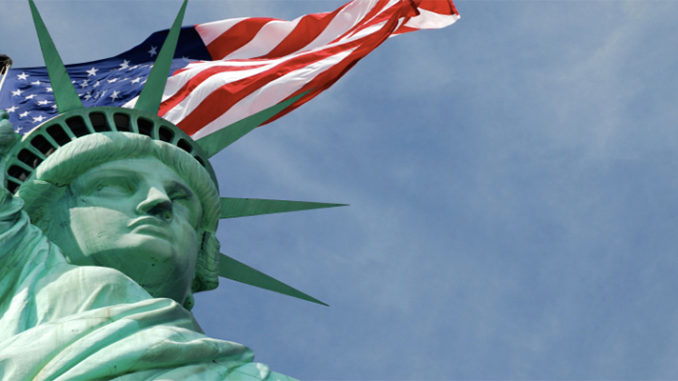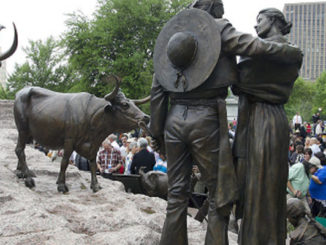
by Alex Gonzalez
As strange as it may appear, The DREAM ACT is a true America approach for citizenship. As history has shown, there is no more intimate experience to build a national identity than bond between individuals who fight wars together for a nation. In building a strong national identity, individuals and different “ethnic” groups come together to fight for common ideals and in defense of a nation. This is what has made our national character exceptional, and our “fighting spirit” the defender of such national character.
According to, Blood Brothers: The Dual Origins of American Bellicosity, by Stephen Peter Rosenlt, our national creed, in part, was developed by our fighting spirit, which we inherited from Puritan religious righteousness and ideals that dictate obedience to the rule of law and the need to defend “Godly” laws created by a “civic” political groups of man. New England Puritans were not pacific, because, violence, when employed, had to be sanctioned by a legitimate authority. Puritans emphasized social order, and crimes against order were heavily penalized. Hence, force–military intervention–often brutal, had to be socially authorized before it could occur. Essentially, we fight wars when we find it necessary to establish the rule of law and to punish a transgressor.
Additionally, our national fighting spirit–and which contributed to our current strong military attitude in the South–was inherited from Scott-Irish settlers who brought with them their cultural ethnic “fighting spirit” and settled in the South. The Scots-Irish treated warfare in response to challenges as a matter of individual honor and self-respect. The New England Puritan tradition treated warfare as righteous if authorized by a higher legal or moral authority that upheld the larger community’s need to enforce or restore order. Therefore, our national identity and fighting spirit, or “American-ness”, was(is) developed and is solidified in a war when individuals–American soldiers–and ethnic groups, act in together defense of common ideals and identity.
Similarly, according to Samuel Huntington, national identities are constructed by ideology. People develop their identity “under varying degrees of pressure, inducement and freedom, and identities are imagined selves, which can later be used to build a national character by putting many individuals together under pressure (war) to create a bond.” Also, identities are defined by the self but they are the product of the interaction between the self and the others. For example, people can aspire to an identity but not be able to achieve it unless they are welcomed by the those who already have that identity. So in order to define themselves, people need one another; and they, too, need an enemy. Huntington argues that “there is an inherent need of humans to preserve and unite, but also to seek kill and destroy.“ This tendency appears in adolescence when the ‘other’ group becomes the ‘enemy’. So as long the other group keeps their distance, this togetherness gives aid and comfort to individuals… it makes our comparison with ourselves gratifying.” Thus, the need for self-esteem leads them to believe that their group is better than the other groups. As a consequence, our military American fighting spirit, creed, and identity is an essential development of who we are as a nation because out of many we have become one by fighting war together; and because we–many ethnic groups–have fought common enemies.
Furthermore, according to Huntington, wars make a nation and nationalism. People develop their sense of national identity as they fight to differentiate themselves from other people. In order to promote a national consciousness, in 17th century, Kings began to use the word “nation” to rally the “people” against other nations. For example, the British identity was a byproduct of the war against France, and continental Catholicism. The lumping together of the English, Scotts, and Wales consequently caused the residents of the British Isles to define themselves collectively as the British against the powerful Catholic France. Similarly, the American colonies developed their own ideological and real enemies. Among one of the single most important factors that developed American identity, or creed, Huntington argues, was the coming together of various British settler sects during the war against the Indians and British soldiers; “the American image of an English enemy was the first ideological enemy image in modern history.” Similarly, after the Indian War of 1675-76 in New England English settlers never trusted the Indians again with trade or land, and instead, drew psychological and physical boundaries between “white” settlers and Indians. By fighting together against the Indians the “Puritan English colonists became Americans”.
The children of pre-1914 Immigrants filled American armies in WW II, and the needs of the war efforts dictated that America be portrayed for what it was, a truly multiethnic society. Your ordinary and typical war movie often featured an Italian, a Jew, an Irishman, a Polish man, and other old American types from the far west, and hills of Tennessee. And this motif was not confined to Hollywood but also used in military propaganda when they showed black and white reels depicting many ethnic groups fighting Nazism. The lumping of various backgrounds in addition to the ethnic names used, gave the impression that those who died together, could live together. Huntington argued that American identity was a product of multiethnic society that dates from and, in some measure, was a product of WW II.
The DREAM Act requires that those who came here at young age, and who may not know any other nation or language, engage in this bonding tradition that developed our strong nation identity as Americans. The DREAM Act, in essence, promotes a rekindling once more of our national “fighting spirit”, and which will bring young Hispanics closer to a full integration to our national creed and to a mainstream American identity. If Huntington is right, people can aspire to an identity but not be able to achieve it unless they are welcome by the those who already have that identity. DREAMers already have an American identity, and their participation in the military will strengthen their fighting spirit and identity as Americans. As a result, we should welcome them into our United States Armed Forces.
Those southern conservative politicians and commentators who often remind us that we are losing our national character, and who themselves are inheritors of the Scott-Irish fighting spirit, should support DREAMers because they will be the new stock of fighters who will ultimately be in charge of protecting our traditional fighting spirit, conservative values and the Constitution.
Furthermore, conservative politicians should acknowledge, the sins of the fathers are not the sins of the DREAMers, the same way that the “original sins” of our Founding Fathers are no longer our sins. Therefore, we feel morally freed from any past guilt. Our individualistic values have liberated us from any past sins, because, under conservatism, each individual ought to judge and be held accountable for their own acts and personal character. This is why we should set the DREAMers free of any past fault and let them be free Americans. This is the same principle that built our great nation.



